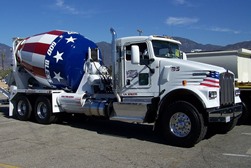How to Select the Right CDL Training Classes near Ontario California
 Congratulations on your decision to become a truck driver and enroll in a truck driving school near Ontario CA. Perhaps it has always been your fantasy to hit the open road while driving a big ole tractor trailer. Or possibly you have conducted some analysis and have found that an occupation as a truck driver provides excellent pay and flexible work prospects. Whatever your reason is, it's essential to get the appropriate training by selecting the right CDL school in your area. When evaluating your options, there are various variables that you'll want to consider prior to making your final selection. Location will undoubtedly be an issue, especially if you need to commute from your Ontario residence. The expense will also be important, but selecting a school based exclusively on price is not the ideal method to ensure you'll obtain the right training. Don't forget, your objective is to learn the skills and knowledge that will enable you to pass the CDL examinations and become a qualified truck driver. So keeping that objective in mind, just how do you pick a truck driving school? The answer to that question is what we are going to address in the rest of this article. But first, we are going to talk a little bit about which CDL license you will ultimately need.
Congratulations on your decision to become a truck driver and enroll in a truck driving school near Ontario CA. Perhaps it has always been your fantasy to hit the open road while driving a big ole tractor trailer. Or possibly you have conducted some analysis and have found that an occupation as a truck driver provides excellent pay and flexible work prospects. Whatever your reason is, it's essential to get the appropriate training by selecting the right CDL school in your area. When evaluating your options, there are various variables that you'll want to consider prior to making your final selection. Location will undoubtedly be an issue, especially if you need to commute from your Ontario residence. The expense will also be important, but selecting a school based exclusively on price is not the ideal method to ensure you'll obtain the right training. Don't forget, your objective is to learn the skills and knowledge that will enable you to pass the CDL examinations and become a qualified truck driver. So keeping that objective in mind, just how do you pick a truck driving school? The answer to that question is what we are going to address in the rest of this article. But first, we are going to talk a little bit about which CDL license you will ultimately need.
Which Commercial Drivers License Will You Need?

To drive commercial vehicles lawfully within the United States and Ontario CA, a driver must get a CDL (Commercial Driver's License). The 3 classes of licenses that a driver can apply for are Class A, Class B and Class C. Given that the topic of this article is how to select a truck driver school, we will focus on Class A and Class B licenses. What distinguishes each class of CDL is the type of vehicle that the driver can operate together with the GVWR (Gross Vehicle Weight Rating) or GCWR (Gross Combination Weight Rating). Following are short descriptions of the two classes.
Class A CDL. A Class A CDL is needed to operate any vehicle that has a GCWR of greater than 26,000 lbs., including a towed vehicle of more than 10,000 lbs. A few of the vehicles that operators may be able to drive with Class A licenses are:
- Interstate or Intrastate Tractor Trailers
- Trucks with Double or Triple Trailers
- Tanker Trucks
- Livestock Carriers
- Class B and Class C Vehicles
Class B CDL. A Class B CDL is needed to operate single vehicles having a GVWR of more than 26,000 lbs., or a GCWR of greater than 26,000 lbs. including a towed vehicle weighing up to 10,000 lbs. A few of the vehicles that drivers may be qualified to operate with Class B licenses are:
- Tractor Trailers
- Dump Trucks
- Cement Mixers
- Large Buses
- Class C Vehicles
Both Class A and Class B CDLs might also require endorsements to drive certain types of vehicles, for instance school or passenger buses. And a Class A license holder, with the appropriate needed endorsements, can drive any vehicle that a Class B license holder is authorized to operate.
How to Assess a Trucking School

When you have determined which CDL you wish to obtain, you can start the process of evaluating the Ontario CA trucking schools that you are looking at. As already mentioned, cost and location will certainly be your initial concerns. But it can't be stressed enough that they should not be your only concerns. Other variables, including the experience of the instructors or the reputations of the schools are equally if not more important. So following are several more points that you need to research while conducting your due diligence prior to choosing, and particularly paying for, your truck driver training.
Are the Schools Certified or Accredited ? Not many truck driver schools in the Ontario CA area are accredited due to the demanding process and cost to the schools. However, certification is more prevalent and is offered by the Professional Truck Driver Institute (PTDI). A school is not obligated to become certified, but there are a number of advantages. Interested students know that the training will be of the highest caliber, and that they will be given an ample amount of driving time. As an example, PTDI mandates 44 hours of actual driving time, not ride-alongs or simulations. So if a school's program is certified (the program, not the school is certified), students know that the training and curriculum will fulfill the very high standards set by PTDI.
How Long in Operation? One clue to help assess the quality of a truck driving school is how long it has been in operation. A negatively rated or a fly by night school usually will not be in business very long, so longevity is a plus. Having said that, even the best of Ontario CA schools had to start from their opening day of training, so consider it as one of multiple qualifications. You can also ask what the school's track record is concerning successful licensing and job placement of its graduates. If a school won't share those stats, look elsewhere. The schools should additionally maintain associations with local and national trucking companies. Having a large number of contacts not only confirms a superior reputation within the industry, but also bolsters their job placement program for students. It also wouldn't be a bad idea to contact the California licensing department to make sure that the CDL trucking schools you are considering are in good standing.
How Good is the Training? At a minimum, the schools should be licensed in California and employ teachers that are experienced and trained. We will discuss more about the instructors in the following segment. In addition, the student to instructor proportion should be no higher than 4 to 1. If it's any greater, then students will not be receiving the personal instruction they will need. This is especially true regarding the one-on-one instruction for behind the wheel training. And watch out for any school that insists it can train you to drive trucks in a relatively short time period. Training to be a truck driver and to drive a tractor trailer professionally takes time. Most Ontario CA schools offer training programs that range from 3 weeks to as long as 2 months, depending on the class of license or type of vehicle.
How Experienced are the Teachers? As earlier mentioned, it's important that the instructors are trained to teach driving techniques and experienced as both drivers and instructors. Although a number of states have minimum driving time prerequisites to be certified as a teacher, the more successful driving experience a teacher has the better. It's also important that the instructors keep up to date with industry advancements or any new laws or changes in regulations. Assessing instructors may be a little more subjective than other standards, and perhaps the ideal method is to visit the school and talk to the teachers in person. You can also talk to a few of the students going through the training and find out if they are satisfied with the quality of instruction and the teacher's qualification to train them.
Plenty of Driving Time? Most importantly, an excellent trucking school will provide lots of driving time to its students. Besides, isn't that what it's all about? Driving time is the actual time spent behind the wheel driving a truck. While the use of simulators and ride-a-longs with other students are essential training methods, they are no replacement for real driving. The more instruction that a student receives behind the wheel, the better driver he or she will become. Although driving time fluctuates among schools, a reasonable benchmark is a minimum of 32 hours. If the school is PTDI certified, it will furnish a minimum of 44 hours of driving time. Check with the Ontario CA schools you are looking at and find out how much driving time they provide.
Are they Independent or Captive ? You can get free or discounted training from certain truck driving schools if you make a commitment to drive for a specified carrier for a defined time period. This is referred to as contract training, and the schools that offer it are called captives. So rather than having associations with a wide range of trucking lines that they can refer their students to, captives only work with one company. The benefit is receiving free or less expensive training by giving up the flexibility to initially be a driver wherever you have an opportunity. Naturally contract training has the potential to reduce your income prospects when starting out. But for some it may be the best way to receive affordable training. Just remember to ask if the Ontario CA schools you are looking at are independent or captive so that you can make an informed decision.
Provide CDL Testing Onsite? There are several states that will allow 3rd party CDL testing onsite of truck driving schools for its grads. If onsite testing is permitted in California, find out if the schools you are looking at are DMV certified to offer it. One benefit is that it is more convenient than competing with graduates of competing schools for test times at California testing facilities. It is also an indication that the DMV views the approved schools to be of a superior quality.
Are the Class Times Convenient? As previously mentioned, truck driving training is only about one to two months long. With such a brief term, it's important that the Ontario CA school you choose provides flexibility for both the curriculum and the scheduling of classes. For example, if you're having a hard time learning a particular driving maneuver, then the instructor should be prepared to devote more time with you until you are proficient. And if you're still working while going to training, then the class scheduling needs to be flexible enough to fit in working hours or other responsibilities.
Is Job Placement Offered? The moment you have received your CDL license after graduating from trucking school, you will be eager to start your new profession. Confirm that the schools you are looking at have job assistance programs. Ask what their job placement percentage is and what average salary their graduates start at. Also, find out which national and local trucking firms their graduates are placed with for hiring. If a school has a lower job placement rate or not many Ontario CA employers recruiting their graduates, it might be a sign to search elsewhere.
Is Financial Aid Given? Truck driving schools are comparable to colleges and other Ontario CA area trade or technical schools when it comes to loans and other forms of financial aid being offered. Ask if the schools you are evaluating have a financial assistance department, or at least someone who can help you understand the options and forms that need to be submitted.
Find Out More About Ontario CDL Driving Schools
Select the Right Ontario CA Truck Driver Training
Selecting the right truck driving school is an important first step to beginning your new vocation as a local or long distance truck driver. The skills that you will learn at school will be those that forge a new career behind the wheel. There are several options available and understanding them is crucial to a new driver's success. However, you must receive the appropriate training in order to drive a large commercial vehicle in a professional and safe fashion. If you are short on funds or financing, you may need to think about a captive school. You will pay a lower or in some cases no tuition by agreeing to drive for their contracted carrier. Or you can enroll in an independent trucking school and have the option of driving for the trucking company of your choice, or one of many associated with the school. It's your decision. But regardless of how you receive your training, you will in the near future be part of an industry that helps America move as a professional truck driver in Ontario CA.
